Past Events
- Women’s day with the IEEE-SRM student branch March 5, 2022
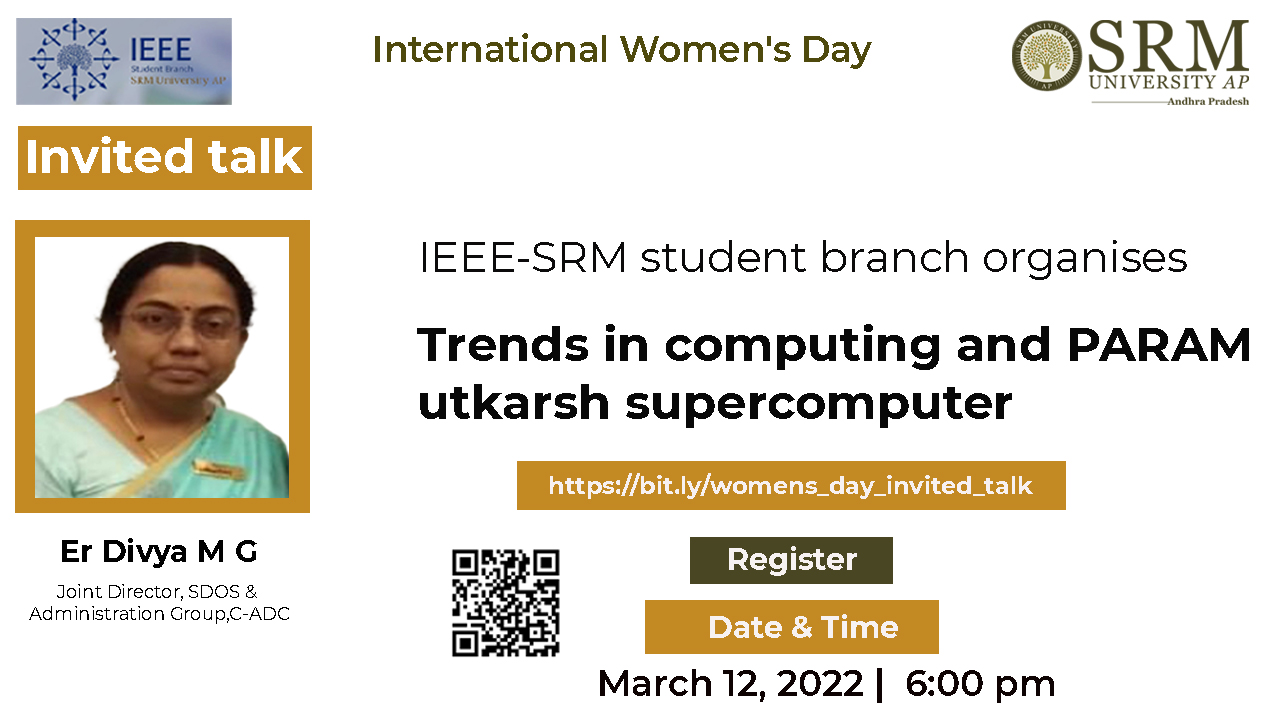
In collaboration with IEEE-SRM Student Branch, SRM University-AP, Andhra Pradesh, is organising an invited talk to mark “Women’s Day 2022”. We have invited Er Divya M G, Joint Director, SDOS & Administration Group, at Centre for Development of Advanced Computing (C-DAC), Bangalore as the guest speaker. She will elucidate on the topic “Trends in computing and PARAM utkarsh supercomputer” on March 12, 2022, at 6.00 pm.
PARAM Utkarsh is a High-Performance Computing System run by the National Supercomputing Mission (NSM) of the Indian government at C-DAC in Bangalore. As a cloud service, this system provides Artificial Intelligence over Machine Learning and Deep Learning frameworks.
Women’s day aims to promote a gender-neutral society. This year’s theme is #BreakTheBias. Bias, whether intentional or unconscious, makes it difficult for women to advance in their personal and professional life. International Women’s Day (March 8) is a worldwide celebration of women’s social, economic, cultural, and political accomplishments. The day also serves as a rallying point for women’s equality. Er Divya, recipient of the “2020 IEEE Women in Engineering Inspiring Members of the Year Award”, is the befitting speaker of the occasion.
Join this inspiring session on March 12, 2022, at 6.00 pm.
Continue reading → - Who invented this? On the origin of disruptive technologies December 16, 2021
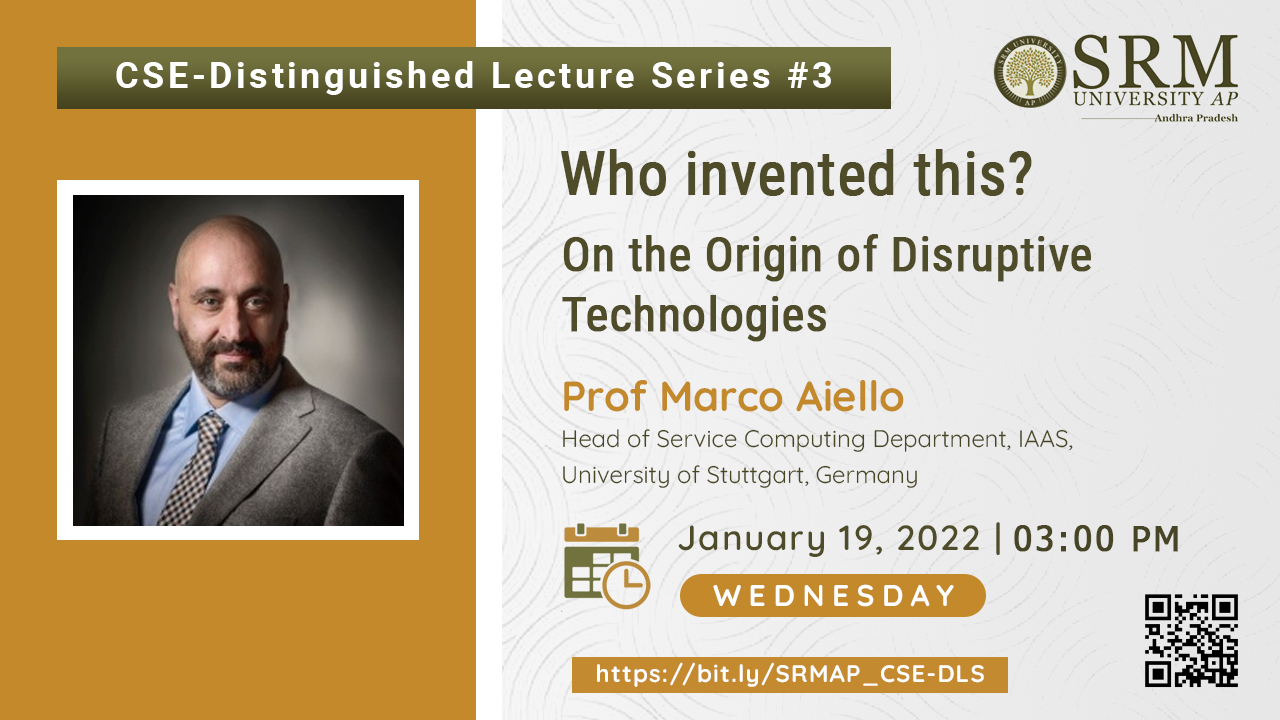
The Department of Computer Science and Engineering at SRM University-AP is organising the third lecture in the Distinguished Lecture Series on January 19, 2022, at 03.00 pm through virtual mode.
Prof Dr Marco Aiello, Head of Service Computing Department, IAAS in the University of Stuttgart, Germany, will be the esteemed speaker elaborating on the topic “Who invented this? On the Origin of Disruptive Technologies”.
The birth and evolution of ICT have been constellated by radical and rapid innovation originating from all kinds of sources. The Internet resulted from an effort started by the American government, Bluetooth came from a large European company, and the Web sprouted from a personal project of a CERN employee. In this talk, I will pick from the short but incredibly dense history of ICT to reflect on the evolution of innovation under the lenses of amateurism versus large scale, professional designs. In doing so, my main attention will be devoted to the Internet, the Web, and Service-Oriented Architectures.
Biography of Prof Dr Marco Aiello, University of Stuttgart, Germany
Marco Aiello is a professor of Computer Science and Head of the Service Computing Department at the University of Stuttgart, Germany. An elected member of the European Academy of Sciences and Arts, he is an honorary professor of Distributed Systems at the University of Groningen, The Netherlands, where he was a faculty member from 2006 till 2018. He holds a PhD in Logic from the University of Amsterdam, the Habilitation in Applied Informatics from TU Wien, and a master degree in Engineering from the La Sapienza University of Rome. His research interests are in Service Computing, Smart Energy Systems, Smart Buildings, and Spatial Reasoning. He is a member of the Scientific Advisory Board for Informatics of the Lorentz Center, Leiden, The Netherlands and Steering committee Faculty of Exact Sciences, University of Modena and Reggio Emilia, Italy. He has been a board member of the start-up Nerdalize BV, The Netherlands and Visiting Fellow of Macquarie University, Australia.
He has authored over 190 peer-reviewed articles and several books, including two bestsellers, and the most recent “The Web Was Done by Amateurs: A Reflection on One of the Largest Collective Systems Ever Engineered” published by Springer-Nature. He is a steering committee chair of the Service-Oriented Computing and Applications (SOCA) Conference. He has delivered several invited/panel talks at reputed conferences and workshops. He is the Editorial Board of various reputed journals like Energy Informatics (Springer), Journal on Service-Oriented Computing and Applications (Springer), International Journal of Web Services Research (IJWSR), Annals of Computer Science and Information Systems. He was the Information Director of the Transactions on Computational Logic of the Association of Computing Machinery (ACM) from its foundation in 2000 until 2014. He has got several awards and recognitions. He has executed 12 research projects. Since 2006, he has been investigating Service-centric software engineering, Smart energy cities, Energy-aware buildings, Energy-aware data centres and many more.
Stay tuned, and don’t forget to participate in this invigorating session on January 19, 2022.
Continue reading → - Quantum computing and communications: New paradigm November 16, 2021
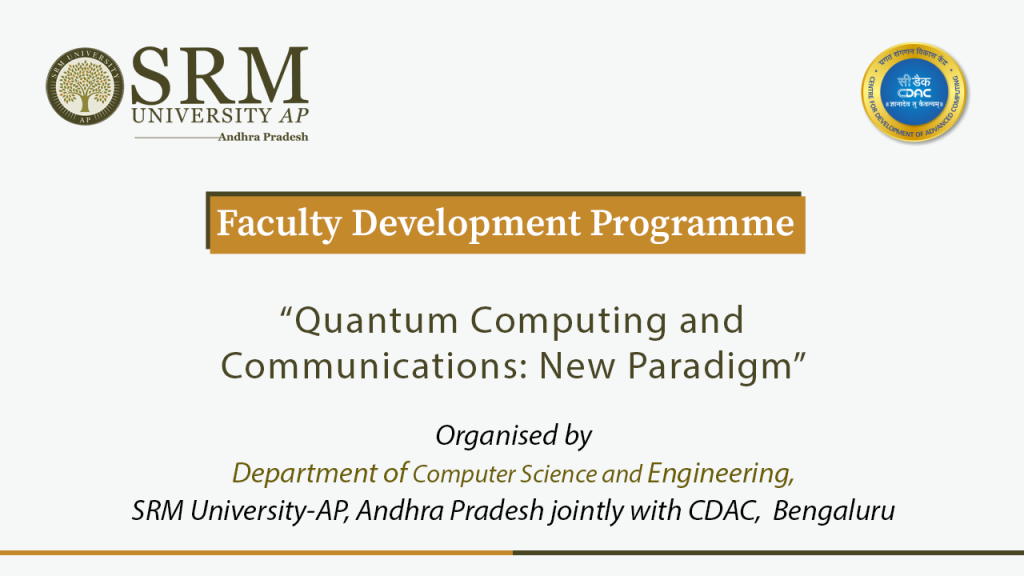 Quantum computing is one of the most significant scientific breakthroughs of the century. The Computer Science and Engineering Department at SRM university-AP is organising an online Faculty Development Programme (FDP) on the topic “Quantum Computing and Communications: New Paradigm” from December 27 to 31, 2021 for scholars from various reputed universities and institutions. The programme organised jointly with CDAC, Bengaluru, will be inaugurated on December 27, 2021, at 9.30 am.
Quantum computing is one of the most significant scientific breakthroughs of the century. The Computer Science and Engineering Department at SRM university-AP is organising an online Faculty Development Programme (FDP) on the topic “Quantum Computing and Communications: New Paradigm” from December 27 to 31, 2021 for scholars from various reputed universities and institutions. The programme organised jointly with CDAC, Bengaluru, will be inaugurated on December 27, 2021, at 9.30 am.Quantum computing is a new disruptive paradigm based on the principles of quantum mechanics to solve problems in various fields of science that are beyond the possibilities of classical computing infrastructures. Despite, a lot of theoretical research and hardware implementations, the application of quantum computing in solving a computational problem is yet to be explored. In future, a new generation of quantum technologies will drive the development of disruptive devices, services and systems which will primarily impact imaging and computing of intractable problems, as well as enhance network security.
The FDP aims to provide a comprehensive idea of quantum computing, its applications and research opportunities. Eminent speakers will provide insightful discussions on quantum computing, quantum information, quantum engineering, artificial intelligence, and machine learning. Faculty members, postdoctoral researchers and PhD students from various reputed institutions are the target audience for the FDP.
Date Session 1 (9.30 AM – 11.00) AM) Session 2 (11.30 AM – 1.00 PM) 27/12/2021 Dr Sridharan R Topic: Quantum Computing and Research Scope
Sandeep Deb Topic: Quantum Secure Cryptography
28/12/2021 Dr Natarajan Venkatachalam Topic: Quantum Network
Dr Asvija Topic: Quantum Network
29/12/2021 Prof Vimal Bhatia Topic: Quantum Secured Future Optical Networks
Prof Konstantin E Dorfman Topic: Multi-Dimensional Optical Sensing with Quantum Light
30/12/2021 Prof Monica Aggarwal Topic: Quantum Machine Learning
Dr Debanjan Konar Topic: Hands-on – IBM Quantum Computer
31/12/2021 Sudeep S Topic: Hands-on – IBM Quantum Computer
Dr Indranil Chakrabarty Topic: Quantum Information Theory
Avail yourself the opportunity to interact with the brightest minds in academia from 27 to 31 December 2021.
Continue reading → - Towards building a smartphone-based system for improving the efficiency of farms in India August 27, 2021
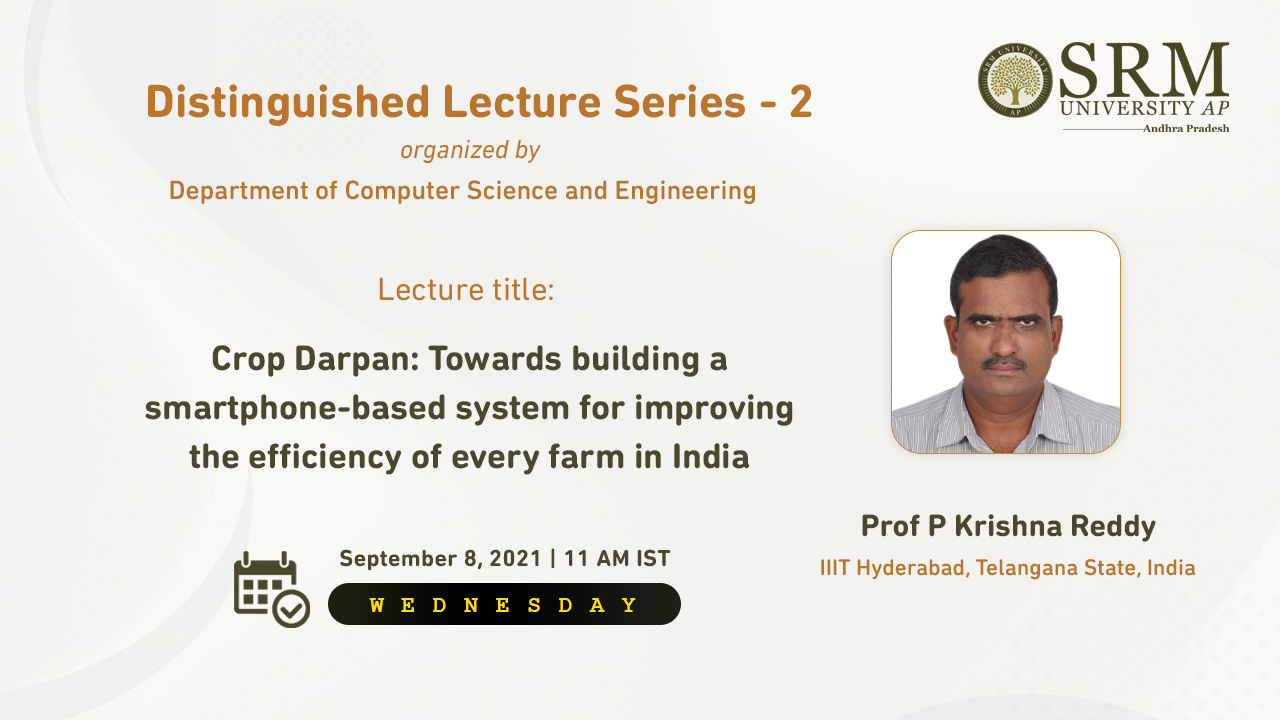 Despite the variety of traditional and IT-based agricultural information delivery approaches, the majority of Indian farmers are not acquiring or provided with actionable agricultural information in a timely and regular manner. A lecture titled “Crop Darpan: Towards building a smartphone-based system for improving the efficiency of every farm in India” will be organised by the Department of Computer Science and Engineering on September 08, 2021, at 11.00 am to address the issue of the lab to the land gap in agriculture. Prof P Krishna Reddy, from IIIT Hyderabad, will talk about the eSagu system, an IT-based farm-specific agro-advisory system field-tested on about 50 field and horticultural crops in hundreds of villages.
Despite the variety of traditional and IT-based agricultural information delivery approaches, the majority of Indian farmers are not acquiring or provided with actionable agricultural information in a timely and regular manner. A lecture titled “Crop Darpan: Towards building a smartphone-based system for improving the efficiency of every farm in India” will be organised by the Department of Computer Science and Engineering on September 08, 2021, at 11.00 am to address the issue of the lab to the land gap in agriculture. Prof P Krishna Reddy, from IIIT Hyderabad, will talk about the eSagu system, an IT-based farm-specific agro-advisory system field-tested on about 50 field and horticultural crops in hundreds of villages.Since 2004, research efforts are being made at IIIT Hyderabad to investigate the building of IT-based agro-advisory systems to deliver actionable agro-advice to every farm field of India in a timely manner. In this connection, they have built the eSagu system and village-level eSagu system. They are also currently investigating the building of the Crop Darpan system. The Crop Darpan App is available for cotton and rice crops at Google Play Store and Apple App Store. In this talk, Prof P Krishna Reddy will share the experiences of building these systems and the future plans.
Biography of the speaker:
Prof P Krishna Reddy is the head of the Agricultural Research Center and a member of the Data Sciences and Analytics Center research team at IIIT Hyderabad, India. From 2013 to 2015, he has served as a Program Director, ITRA-Agriculture & Food, Information Technology Research Academy (ITRA), Government of India. His research areas include data mining, database systems and IT for agriculture. He has published about 189 refereed research papers which include 30 journal papers, four book chapters, and eight edited books. He is a steering committee member of the Pacific-Asia knowledge discovery and data mining (PAKDD) conference series and the Database Systems for Advanced Applications (DASFAA) conference series. He has delivered several invited/panel talks at reputed conferences and workshops in India and abroad. Since 2004, he has been investigating the building efficient knowledge agricultural knowledge transfer systems by extending developments in IT. He has conceptualized the notion of Virtual Crop Labs to improve applied skills for extension professionals. Currently, he is investigating the building of the Crop Darpan system, which is a crop diagnostic tool for farmers, with funding support from the India-Japan Joint Research Laboratory Program. The eSagu system, an IT-based farm-specific agro-advisory system, has got several recognitions including CSI-Nihilent e-Governance Project Award in 2006, Manthan Award in 2008 and has been a finalist in the Stockholm Challenge Award in 2008 and received PAKDD Distinguished Service Award in 2021.Join this illuminating lecture on September 08, 2021, at 11:00 am and gain valuable insights into building a smartphone-based system for improving the efficiency of every farm in India.
Register here: https://srmap.zoom.us/webinar/register/WN_qITnmUdMQjqkvFSM9yGCzA
Continue reading → - Neoteric frontiers in Cloud and Edge computing July 12, 2021
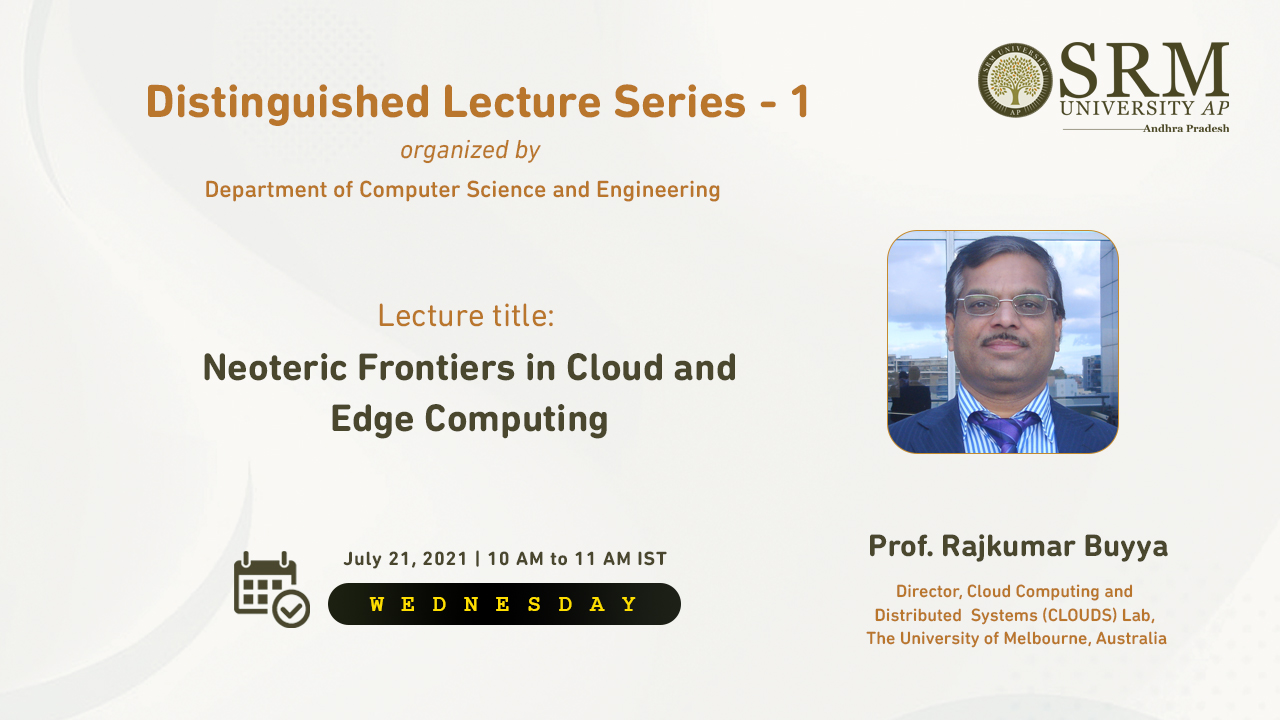 The Department of Computer Science and Engineering (CSE) at SRM University-AP is organising the first session of the Distinguished Lecture Series on the topic “Neoteric Frontiers in Cloud and Edge Computing” on July 21, 2021, Wednesday at 10.00 am. Prof Rajkumar Buyya, Director at Cloud Computing and Distributed Systems (CLOUDS) Lab, University of Melbourne, Australia will be the keynote speaker of this session on emerging fields of Computer Science.
The Department of Computer Science and Engineering (CSE) at SRM University-AP is organising the first session of the Distinguished Lecture Series on the topic “Neoteric Frontiers in Cloud and Edge Computing” on July 21, 2021, Wednesday at 10.00 am. Prof Rajkumar Buyya, Director at Cloud Computing and Distributed Systems (CLOUDS) Lab, University of Melbourne, Australia will be the keynote speaker of this session on emerging fields of Computer Science.The keynote presentation will cover (a) 21st-century vision of computing and identifies various IT paradigms promising to deliver the vision of computing utilities; (b) innovative architecture for creating elastic Clouds integrating edge resources and managed Clouds, (c) Aneka 5G, a Cloud Application Platform, for rapid development of Cloud/Big Data applications and their deployment on private/public Clouds with resource provisioning driven by SLAs, (d) a novel FogBus software framework with Blockchain-based data-integrity management for facilitating end-to-end IoT-Fog/Edge-Cloud integration for execution of sensitive IoT applications, (e) experimental results on deploying Cloud and Big Data/IoT applications in engineering, and health care (e.g., COVID-19), deep learning/Artificial intelligence (AI), satellite image processing, natural language processing (mining COVID-19 research literature for new insights)and smart cities on elastic Clouds; and (f) directions for delivering our 21st-century vision along with pathways for future research in Cloud and Edge/Fog computing.
About the Speaker:
Dr Buyya is the founder and CEO of Manjrasoft, a spin-off firm of the University of Melbourne that commercialises the university’s cloud computing inventions. From 2012 to 2016, he was a Future Fellow of the Australian Research Council. He has over 625 publications and seven textbooks to his credit, including “Mastering Cloud Computing,” which was published by McGraw Hill, China Machine Press, and Morgan Kaufmann for the Indian, Chinese, and international markets. He also edited numerous publications, including “Cloud Computing: Principles and Paradigms” and “Cloud Computing: Principles and Paradigms” (Wiley Press, USA, Feb 2011). The Microsoft Academic Search Index ranked Dr Buyya as the #1 author in the world (2005-2016) for both field rating and citation evaluations in the area of Distributed and Parallel Computing. Dr Buyya was named the World’s Top-Cited (#1) Author and the World’s Most-Productive (#1) Author in Cloud Computing by German scientists in “A Scientometric Analysis of Cloud Computing Literature.” He has been named a “2016 Web of Science Highly Cited Researcher” by Thomson Reuters, as well as a Fellow of IEEE and Scopus Researcher of the Year 2017 with Elsevier’s Excellence in Innovative Research Award. He founded the IEEE Transactions on Cloud Computing and served as its first Editor-in-Chief. He is currently the Co-Editor-in-Chief of the Journal of Software: Practice and Experience, a publication that has been around for almost 45 years.
Join this informative session on July 21, 2021, from 10.00 am onwards and avail yourself of the opportunity to learn about the emerging computing paradigms and Cloud and Edge computing models.
Register here: https://srmap.zoom.us/webinar/register/WN_aJ7ImJMLSPmpBxtVv0M1qA
Continue reading →

